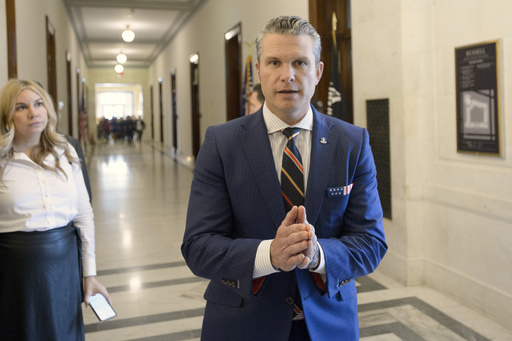In a significant milestone, 2nd Lt. Khady Ndiaye made history as she became the first Muslim woman to be commissioned as a chaplain candidate in the U.S. Army. This momentous occasion took place in June during a ceremony held at a chapel located in Fort Liberty, North Carolina. She was proudly adorned in a hijab, symbolizing a key moment for diversity in the military’s chaplaincy. The event was overseen by Maj. Gen. Bill Green, the Army’s chief of chaplains, who remarked on the inclusive nature of chaplains serving various faiths, attending to the needs of the entire Army family, irrespective of their individual beliefs.
The dedication to nurturing religious diversity comes under scrutiny with the potential confirmation of Pete Hegseth as the next Secretary of Defense. Hegseth has been known to express conservative Christian viewpoints in militaristic terms and has historically defended the Crusades while positioning the military’s diversity initiatives as unnecessary. Such perspectives could pose challenges to the military’s existing commitment to fostering an inclusive environment for its diverse personnel, which encompasses approximately 1.3 million active-duty service members.
According to Ronit Stahl, a historian and author, the U.S. military is one of the most diverse entities in American life, encompassing a broad spectrum of backgrounds and beliefs. Stahl noted that the military’s journey toward religious inclusion has not been smooth, suggesting that having a defense secretary who emphasizes a particular strand of Christianity could adversely affect the military’s ethos of pluralism.
The evolution of the military chaplaincy reflects America’s changing demographics. Initially, it was largely composed of mainline Protestant and Catholic chaplains before expanding during World War I to include Jewish and Mormon chaplains. More recently, the military has introduced chaplains of various faiths, including Muslim, Hindu, and Buddhist representatives, while also making accommodations for practices like Sikh turbans and beards.
A report from 2019 revealed that around 70% of active-duty military members identify as Christian, with 20% identifying as Catholic. There remains a significant segment, approximately a quarter, classified under “other/unclassified/unknown,” highlighting the need for a broader understanding of religious identities within the ranks. The army’s official website portrays its chaplaincy as a diverse program accommodating various faith leaders, from imams to rabbis.
Rabbi Scott Klein, currently serving as an Army chaplain, emphasized that the military has made noteworthy progress in creating an interfaith atmosphere. He pointed out the importance of education and training to foster greater understanding between different faith traditions, which could help dispel misconceptions and promote unity.
In the U.S. Navy, there are 874 chaplains, primarily representing several Protestant denominations, alongside Catholic, Jewish, and Muslim chaplains. Hegseth’s nomination requires Senate confirmation, where he faces increasing scrutiny due to various controversies, including allegations of misconduct and mismanagement.
Hegseth, a veteran of the Army National Guard, views America as a Judeo-Christian nation and has made assertive statements regarding the U.S.’s role in global affairs. His position tends to merge Christian values with national identity, calling for a unified defense against opposing ideologies. Critics, including veterans and advocacy groups, express concern over his promotion of what they perceive as fundamentalist Christian dominance within the military.
Nonetheless, he garners support from some quarters, including veterans who echo his beliefs and express a desire to reduce focus on diversity initiatives, arguing that such efforts detract from the military’s core mission of solidarity.
Concerns about Hegseth’s views on Islam and his support for Israel’s territorial claims raise alarms among various organizations, including the Council on American-Islamic Relations, which has openly opposed his appointment. Scholars have also weighed in on Hegseth’s rhetoric, particularly his reference to historical conflicts between Christianity and Islam, and his promotion of a militaristic narrative surrounding religious dominance.
Larry Wilkerson, a retired colonel, criticized Hegseth’s appointment, advocating for a leadership approach that embraces diversity and understanding rather than imposing a singular viewpoint. The discussion surrounding Hegseth’s potential role as Secretary of Defense encapsulates broader themes of religious pluralism, military identity, and the challenges of leading a diverse force in contemporary America.


